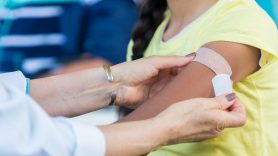HPV vaccine and age: What to know
Our expert explains who should get the HPV vaccine and at what age.

When it comes to the HPV vaccine there are a lot of numbers to know. What age should your kids get it? And do they get two shots or three? What age should you get it and when is it too late?
The answers are important. The HPV vaccine protects against six types of cancer caused by human papillomavirus (HPV): cervical, anal, penile, vaginal, throat cancers and cancer of the vulva.
Here’s what you need to know about HPV and age.
Birth – 8 years old. Children are too young to get the HPV vaccine at this age. If you are a parent, spend this time learning about the benefits of the vaccine.
If you have questions, now is a good time to ask your pediatrician for the facts. You also can spend time preparing for how to talk to your kids about the vaccine.
9-10 years old. This is the first window where your child is approved to get the HPV vaccine. If you and your child feel ready, go ahead and ask your pediatrician about it at your next visit.
Two shots are required and they are given at least six months apart. If you forget and go longer than six months, it’s OK.
11-12 years old. If you didn’t talk to your pediatrician about the vaccine when your child was 9 or 10, then now’s the time. Kids who are age 9-12 have time to develop the best immune response. It also is well before they will likely be exposed to HPV.
Your child will need two shots, at least six months apart.
13-14 years old. If you missed the age 11-12 window, don’t worry. Head to the pediatrician to get the series of two shots.
15-26 years old. Starting at age 15, your child will need three shots to protect them against HPV. These shots should be given over a six month period.
The second shot is given one to two months after the first. The final shot is usually given four to five months later, so that the whole series is completed in six months.
As a person gets older, it becomes more likely that they will be exposed to the HPV virus. HPV can be transmitted through any intimate sexual contact, including kissing.
But it is still important to get the vaccine, even if you think you have already been exposed to HPV. That’s because the vaccine protects against several strains of the virus. You may be exposed to one, but you can still get protection against the others.
27-45 years old. MD Anderson recommends people in this age group talk to their doctor about the benefits of getting the HPV vaccine.
Around 80% of people will get HPV during their life, but there are several strains of the virus. If you are exposed to one, the vaccine will still protect you against others.
What happens if you do get HPV?
If you get HPV, your immune system will likely clear the virus without it ever causing any problems. Some people may get genital warts.
A small number of people will get a longer lasting infection. An even smaller number of them will go on to develop cancer.
The best way to avoid HPV-related cancers is to limit exposure AND get vaccinated.


